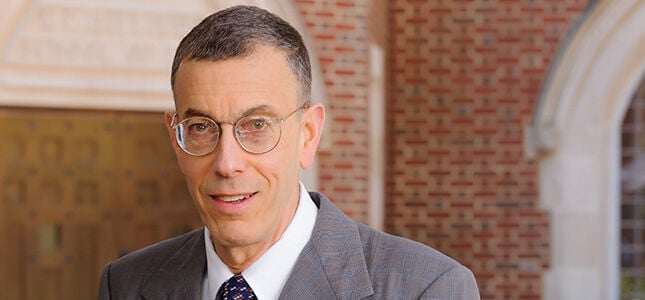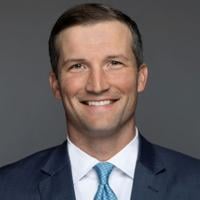
Carl Tobias
CHARLESTON – A law professor says he doesn’t think President Trump’s two nominees for U.S. Attorney positions in West Virginia will have any trouble being confirmed.
On July 1, the White House announced the nominations of Moore Capito to be the next U.S. Attorney for the Southern District of West Virginia and Matt Harvey for the same position in the state’s Northern District.

Moore Capito

Harvey
“Both nominees seem well qualified,” Carl Tobias, the Williams Chair in Law at the University of Richmond’s School of Law, told The West Virginia Record. “Capito seems to have much civil experience, but I can’t tell whether he has much criminal practice experience. Harvey seems to have much prosecutorial experience in the state system, but I don’t know if he has federal experience.
“Most of the dozen nominees (announced Tuesday) seem well qualified and have federal prosecutorial experience. One nominee, Alina Habba, represented Trump in some major cases and is controversial for Democrats because she lacks federal experience and indicted a New Jersey federal representative (LaMonica McIver) whom Habba claimed was interfering with law enforcement, which the representative denied.”
Habba, who has been serving as an acting U.S. Attorney, also recently had Newark Mayor Ras Baraka arrested at the same incident involving McIver for trespassing.
Tobias said he doubts Capito and Harvey will have any problems being nominated by the U.S. Senate.
“I assume that they will have strong support from both West Virginia senators and all of the GOP senators,” Tobias told The Record.
One of those West Virginia senators is Shelley Moore Capito, who happens to be Moore Capito’s mother.
Tobias said he also doesn’t think that will be an issue.
“I doubt that GOP members will find that troubling, and even if they do, his mother could recuse and not vote and he could still be confirmed,” Tobias said.
Critics, including the West Virginia Democratic Party called the timing of the announcement of Moore Capito’s nomination into question Tuesday. It came within minutes of the Senate vote on Trump’s “Big Beautiful Bill.” The Democrats said Senator Capito “is ready to trade her support for the bill in exchange for the appointment of her son” to the “powerful” position.
“One has to wonder why Senator Capito would be such an enthusiastic cheerleader for a bill that is so devastating to West Virginia and its citizens,” West Virginia Democratic Party Chairman Mike Pushkin said in the statement. “One logical explanation is that she’s holding out for a deal … her vote in exchange for her son’s political advancement. If so, that’s not public service — that’s corruption.”
Sen. Capito voted for the bill.
“If Capito votes for this bill and her son ends up as U.S. Attorney, West Virginians will know exactly what happened,” Pushkin said. “Her vote — and our justice system — were put up for sale.”
Again, Tobias said the Democratic pushback isn’t surprising.
“That is to be expected in these very partisan times, and again his mother could choose to not vote,” Tobias said.
Capito, a Republican, served in the House of Delegates from 2016 to 2023. He ran for governor last year, losing in the GOP primary to Patrick Morrisey.
He is the son of Senator Capito and the grandson of former Gov. Arch A. Moore Jr. He also is the cousin of U.S. Rep. Riley Moore (R-W.Va.)
Capito earned a Bachelor of Arts from Duke University and a law degree from the Washington and Lee University School of Law.
According to his campaign website, Capito is a sixth generation West Virginian who labeled himself the “get-it-done” conservative “because he is the only one who has repeatedly turned good conservative ideas into effective public policy.”
He currently is an attorney with Babst Calland in its Charleston office. He is a shareholder in the Corporate and Commercial, Emerging Technologies and Energy and Natural Resources groups of the firm, and he represents publicly-traded and privately-held clients in corporate mergers, acquisitions and divestitures, as well as business structuring, governance, commercial contracts and real estate transactions.
The firm says he represents energy clients in various transactional matters of natural gas assets, joint developments, leasing and operations. He also regularly counsels clients in entity, joint venture and partnership structuring and formation as well as general business matters. And, he advises and counsels companies in navigating the complex legal landscape of emerging technologies, including data center development, ensuring projects are compliant with relevant laws and regulations.
Prior to joining Babst Calland, Capito served as in-house counsel for one of the largest independent oil and gas production and midstream companies in West Virginia and the Appalachian Basin.
Capito is married to commentator and Washington University Professor of Practice of Data Science Liberty Capito. He has two children from a previous marriage.
Harvey currently serves as prosecuting attorney for Jefferson County, and he also serves on the West Virginia First Foundation.
Both Capito and Harvey will have to be confirmed by a congressional vote.







